HA3042 Taxation Law T2 2018: Analysis of Income, Tax Avoidance
VerifiedAdded on 2023/06/07
|16
|4206
|454
Report
AI Summary
This assignment delves into various aspects of taxation law, addressing four key questions. Firstly, it examines whether annual lottery payments should be considered income and thus subject to taxation, considering the potential economic impacts of untaxed winnings. Secondly, it outlines the procedure for calculating a company's taxable income, using Corner Pharmacy as a case study, detailing the calculation of gross sales, deductions, and the final taxable income. Thirdly, the assignment discusses tax avoidance, using the Duke of Westminster's case as an example and exploring the implementation of the Ramsay Principle. Finally, it analyzes the tax implications of selling a rental property, focusing on the effect of agreements on capital gains tax. The document is available on Desklib, a platform offering a range of study tools and resources for students.

Taxation Law 1
Taxation Law
by Student Name
Class
Professor’s Name
University Name
Date
1
Taxation Law
by Student Name
Class
Professor’s Name
University Name
Date
1
Paraphrase This Document
Need a fresh take? Get an instant paraphrase of this document with our AI Paraphraser
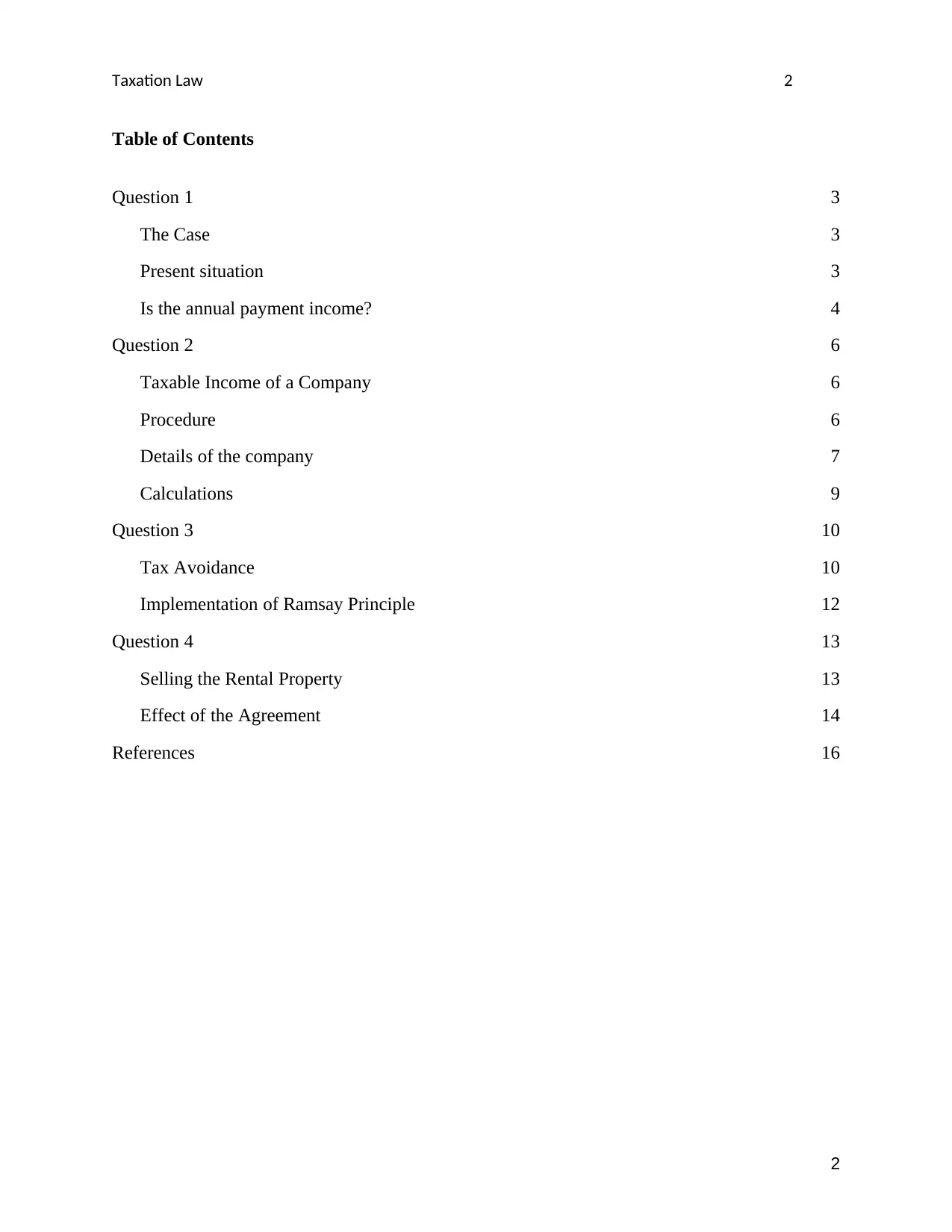
Taxation Law 2
Table of Contents
Question 1 3
The Case 3
Present situation 3
Is the annual payment income? 4
Question 2 6
Taxable Income of a Company 6
Procedure 6
Details of the company 7
Calculations 9
Question 3 10
Tax Avoidance 10
Implementation of Ramsay Principle 12
Question 4 13
Selling the Rental Property 13
Effect of the Agreement 14
References 16
2
Table of Contents
Question 1 3
The Case 3
Present situation 3
Is the annual payment income? 4
Question 2 6
Taxable Income of a Company 6
Procedure 6
Details of the company 7
Calculations 9
Question 3 10
Tax Avoidance 10
Implementation of Ramsay Principle 12
Question 4 13
Selling the Rental Property 13
Effect of the Agreement 14
References 16
2
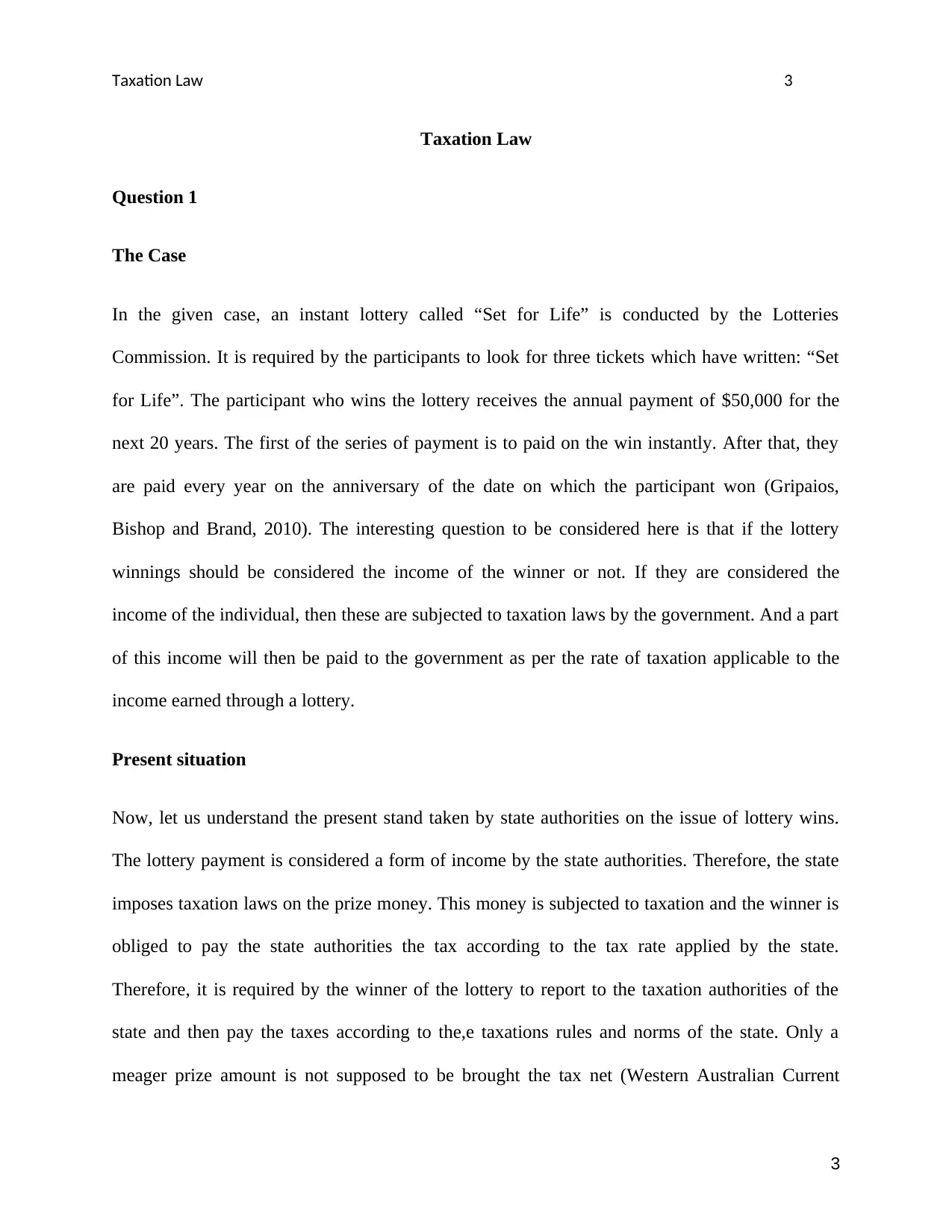
Taxation Law 3
Taxation Law
Question 1
The Case
In the given case, an instant lottery called “Set for Life” is conducted by the Lotteries
Commission. It is required by the participants to look for three tickets which have written: “Set
for Life”. The participant who wins the lottery receives the annual payment of $50,000 for the
next 20 years. The first of the series of payment is to paid on the win instantly. After that, they
are paid every year on the anniversary of the date on which the participant won (Gripaios,
Bishop and Brand, 2010). The interesting question to be considered here is that if the lottery
winnings should be considered the income of the winner or not. If they are considered the
income of the individual, then these are subjected to taxation laws by the government. And a part
of this income will then be paid to the government as per the rate of taxation applicable to the
income earned through a lottery.
Present situation
Now, let us understand the present stand taken by state authorities on the issue of lottery wins.
The lottery payment is considered a form of income by the state authorities. Therefore, the state
imposes taxation laws on the prize money. This money is subjected to taxation and the winner is
obliged to pay the state authorities the tax according to the tax rate applied by the state.
Therefore, it is required by the winner of the lottery to report to the taxation authorities of the
state and then pay the taxes according to the,e taxations rules and norms of the state. Only a
meager prize amount is not supposed to be brought the tax net (Western Australian Current
3
Taxation Law
Question 1
The Case
In the given case, an instant lottery called “Set for Life” is conducted by the Lotteries
Commission. It is required by the participants to look for three tickets which have written: “Set
for Life”. The participant who wins the lottery receives the annual payment of $50,000 for the
next 20 years. The first of the series of payment is to paid on the win instantly. After that, they
are paid every year on the anniversary of the date on which the participant won (Gripaios,
Bishop and Brand, 2010). The interesting question to be considered here is that if the lottery
winnings should be considered the income of the winner or not. If they are considered the
income of the individual, then these are subjected to taxation laws by the government. And a part
of this income will then be paid to the government as per the rate of taxation applicable to the
income earned through a lottery.
Present situation
Now, let us understand the present stand taken by state authorities on the issue of lottery wins.
The lottery payment is considered a form of income by the state authorities. Therefore, the state
imposes taxation laws on the prize money. This money is subjected to taxation and the winner is
obliged to pay the state authorities the tax according to the tax rate applied by the state.
Therefore, it is required by the winner of the lottery to report to the taxation authorities of the
state and then pay the taxes according to the,e taxations rules and norms of the state. Only a
meager prize amount is not supposed to be brought the tax net (Western Australian Current
3
⊘ This is a preview!⊘
Do you want full access?
Subscribe today to unlock all pages.

Trusted by 1+ million students worldwide
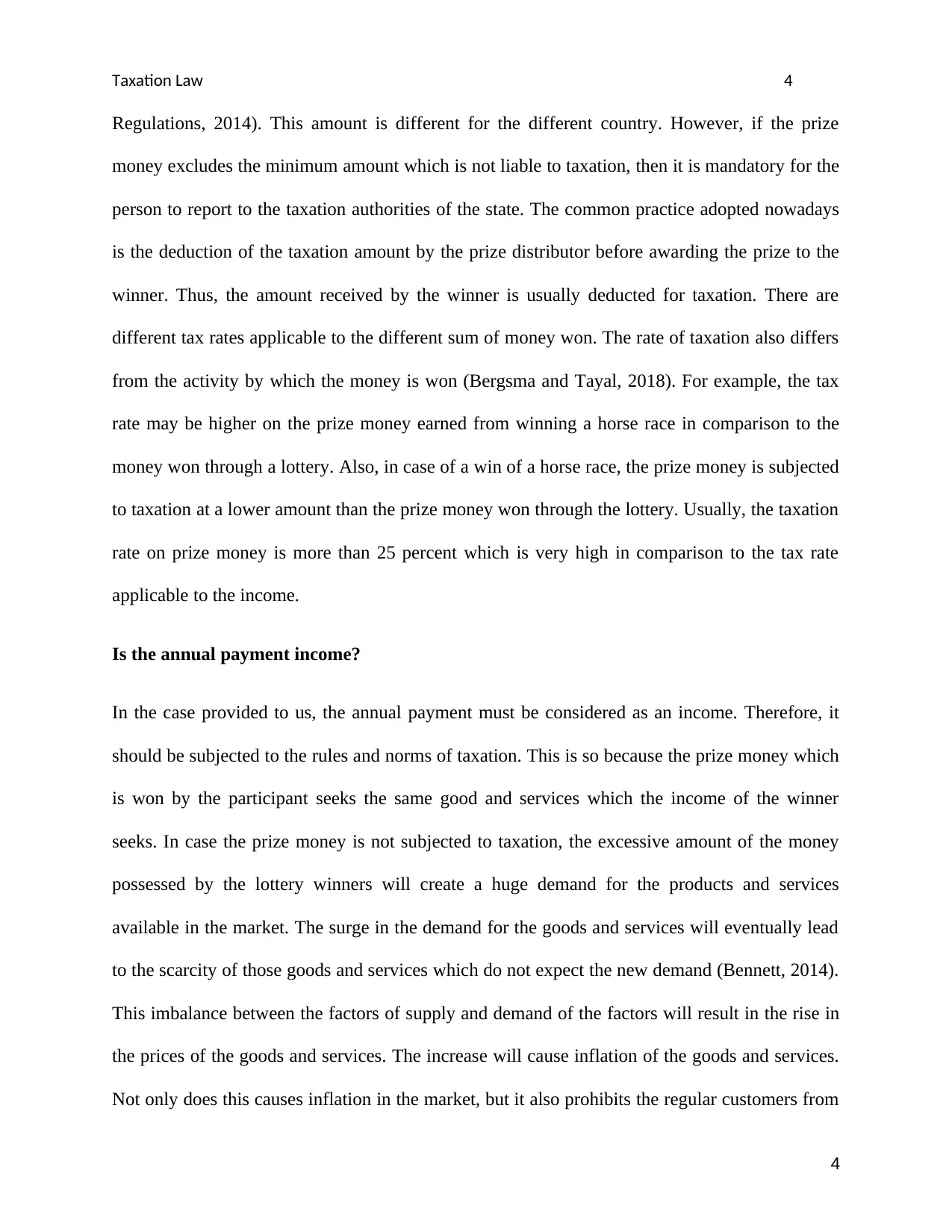
Taxation Law 4
Regulations, 2014). This amount is different for the different country. However, if the prize
money excludes the minimum amount which is not liable to taxation, then it is mandatory for the
person to report to the taxation authorities of the state. The common practice adopted nowadays
is the deduction of the taxation amount by the prize distributor before awarding the prize to the
winner. Thus, the amount received by the winner is usually deducted for taxation. There are
different tax rates applicable to the different sum of money won. The rate of taxation also differs
from the activity by which the money is won (Bergsma and Tayal, 2018). For example, the tax
rate may be higher on the prize money earned from winning a horse race in comparison to the
money won through a lottery. Also, in case of a win of a horse race, the prize money is subjected
to taxation at a lower amount than the prize money won through the lottery. Usually, the taxation
rate on prize money is more than 25 percent which is very high in comparison to the tax rate
applicable to the income.
Is the annual payment income?
In the case provided to us, the annual payment must be considered as an income. Therefore, it
should be subjected to the rules and norms of taxation. This is so because the prize money which
is won by the participant seeks the same good and services which the income of the winner
seeks. In case the prize money is not subjected to taxation, the excessive amount of the money
possessed by the lottery winners will create a huge demand for the products and services
available in the market. The surge in the demand for the goods and services will eventually lead
to the scarcity of those goods and services which do not expect the new demand (Bennett, 2014).
This imbalance between the factors of supply and demand of the factors will result in the rise in
the prices of the goods and services. The increase will cause inflation of the goods and services.
Not only does this causes inflation in the market, but it also prohibits the regular customers from
4
Regulations, 2014). This amount is different for the different country. However, if the prize
money excludes the minimum amount which is not liable to taxation, then it is mandatory for the
person to report to the taxation authorities of the state. The common practice adopted nowadays
is the deduction of the taxation amount by the prize distributor before awarding the prize to the
winner. Thus, the amount received by the winner is usually deducted for taxation. There are
different tax rates applicable to the different sum of money won. The rate of taxation also differs
from the activity by which the money is won (Bergsma and Tayal, 2018). For example, the tax
rate may be higher on the prize money earned from winning a horse race in comparison to the
money won through a lottery. Also, in case of a win of a horse race, the prize money is subjected
to taxation at a lower amount than the prize money won through the lottery. Usually, the taxation
rate on prize money is more than 25 percent which is very high in comparison to the tax rate
applicable to the income.
Is the annual payment income?
In the case provided to us, the annual payment must be considered as an income. Therefore, it
should be subjected to the rules and norms of taxation. This is so because the prize money which
is won by the participant seeks the same good and services which the income of the winner
seeks. In case the prize money is not subjected to taxation, the excessive amount of the money
possessed by the lottery winners will create a huge demand for the products and services
available in the market. The surge in the demand for the goods and services will eventually lead
to the scarcity of those goods and services which do not expect the new demand (Bennett, 2014).
This imbalance between the factors of supply and demand of the factors will result in the rise in
the prices of the goods and services. The increase will cause inflation of the goods and services.
Not only does this causes inflation in the market, but it also prohibits the regular customers from
4
Paraphrase This Document
Need a fresh take? Get an instant paraphrase of this document with our AI Paraphraser
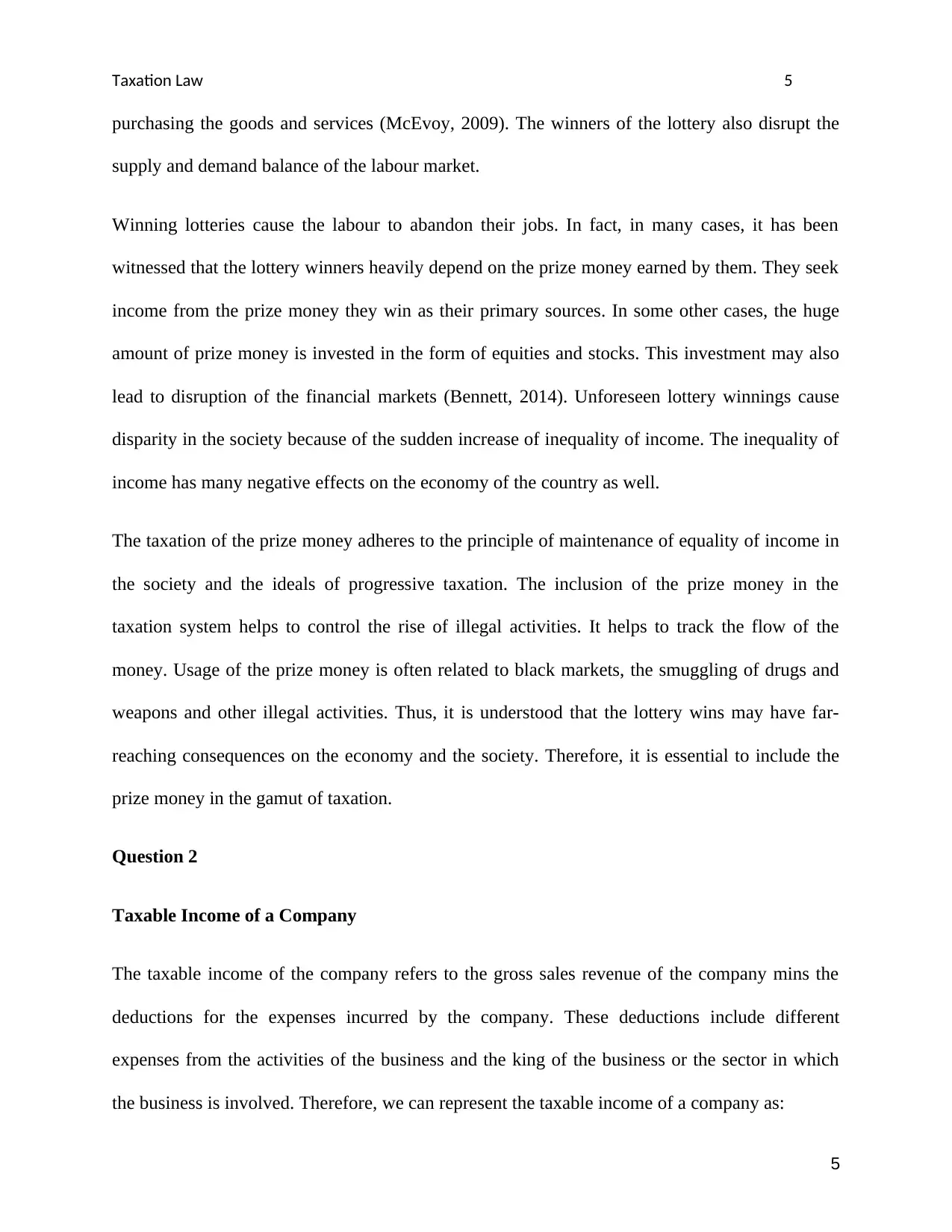
Taxation Law 5
purchasing the goods and services (McEvoy, 2009). The winners of the lottery also disrupt the
supply and demand balance of the labour market.
Winning lotteries cause the labour to abandon their jobs. In fact, in many cases, it has been
witnessed that the lottery winners heavily depend on the prize money earned by them. They seek
income from the prize money they win as their primary sources. In some other cases, the huge
amount of prize money is invested in the form of equities and stocks. This investment may also
lead to disruption of the financial markets (Bennett, 2014). Unforeseen lottery winnings cause
disparity in the society because of the sudden increase of inequality of income. The inequality of
income has many negative effects on the economy of the country as well.
The taxation of the prize money adheres to the principle of maintenance of equality of income in
the society and the ideals of progressive taxation. The inclusion of the prize money in the
taxation system helps to control the rise of illegal activities. It helps to track the flow of the
money. Usage of the prize money is often related to black markets, the smuggling of drugs and
weapons and other illegal activities. Thus, it is understood that the lottery wins may have far-
reaching consequences on the economy and the society. Therefore, it is essential to include the
prize money in the gamut of taxation.
Question 2
Taxable Income of a Company
The taxable income of the company refers to the gross sales revenue of the company mins the
deductions for the expenses incurred by the company. These deductions include different
expenses from the activities of the business and the king of the business or the sector in which
the business is involved. Therefore, we can represent the taxable income of a company as:
5
purchasing the goods and services (McEvoy, 2009). The winners of the lottery also disrupt the
supply and demand balance of the labour market.
Winning lotteries cause the labour to abandon their jobs. In fact, in many cases, it has been
witnessed that the lottery winners heavily depend on the prize money earned by them. They seek
income from the prize money they win as their primary sources. In some other cases, the huge
amount of prize money is invested in the form of equities and stocks. This investment may also
lead to disruption of the financial markets (Bennett, 2014). Unforeseen lottery winnings cause
disparity in the society because of the sudden increase of inequality of income. The inequality of
income has many negative effects on the economy of the country as well.
The taxation of the prize money adheres to the principle of maintenance of equality of income in
the society and the ideals of progressive taxation. The inclusion of the prize money in the
taxation system helps to control the rise of illegal activities. It helps to track the flow of the
money. Usage of the prize money is often related to black markets, the smuggling of drugs and
weapons and other illegal activities. Thus, it is understood that the lottery wins may have far-
reaching consequences on the economy and the society. Therefore, it is essential to include the
prize money in the gamut of taxation.
Question 2
Taxable Income of a Company
The taxable income of the company refers to the gross sales revenue of the company mins the
deductions for the expenses incurred by the company. These deductions include different
expenses from the activities of the business and the king of the business or the sector in which
the business is involved. Therefore, we can represent the taxable income of a company as:
5
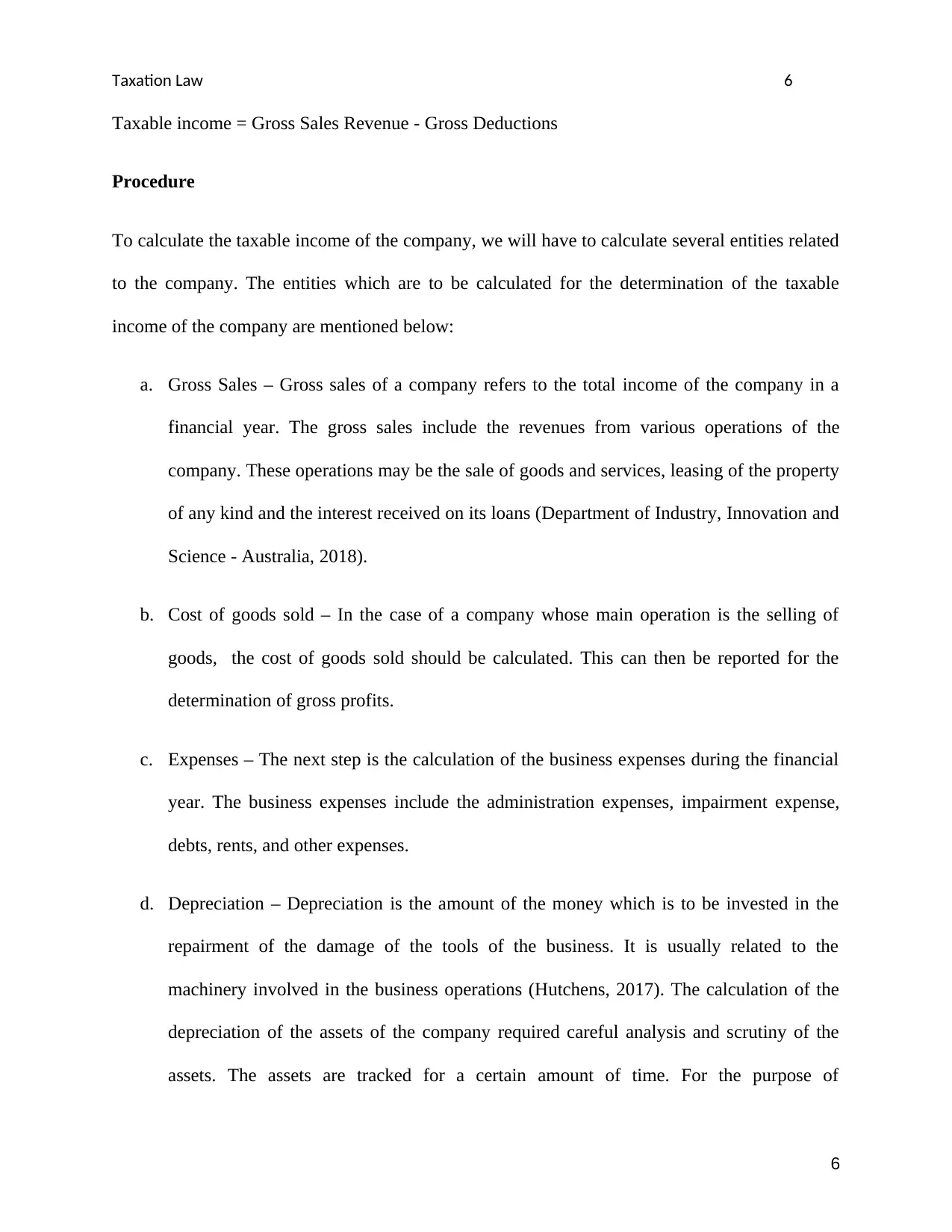
Taxation Law 6
Taxable income = Gross Sales Revenue - Gross Deductions
Procedure
To calculate the taxable income of the company, we will have to calculate several entities related
to the company. The entities which are to be calculated for the determination of the taxable
income of the company are mentioned below:
a. Gross Sales – Gross sales of a company refers to the total income of the company in a
financial year. The gross sales include the revenues from various operations of the
company. These operations may be the sale of goods and services, leasing of the property
of any kind and the interest received on its loans (Department of Industry, Innovation and
Science - Australia, 2018).
b. Cost of goods sold – In the case of a company whose main operation is the selling of
goods, the cost of goods sold should be calculated. This can then be reported for the
determination of gross profits.
c. Expenses – The next step is the calculation of the business expenses during the financial
year. The business expenses include the administration expenses, impairment expense,
debts, rents, and other expenses.
d. Depreciation – Depreciation is the amount of the money which is to be invested in the
repairment of the damage of the tools of the business. It is usually related to the
machinery involved in the business operations (Hutchens, 2017). The calculation of the
depreciation of the assets of the company required careful analysis and scrutiny of the
assets. The assets are tracked for a certain amount of time. For the purpose of
6
Taxable income = Gross Sales Revenue - Gross Deductions
Procedure
To calculate the taxable income of the company, we will have to calculate several entities related
to the company. The entities which are to be calculated for the determination of the taxable
income of the company are mentioned below:
a. Gross Sales – Gross sales of a company refers to the total income of the company in a
financial year. The gross sales include the revenues from various operations of the
company. These operations may be the sale of goods and services, leasing of the property
of any kind and the interest received on its loans (Department of Industry, Innovation and
Science - Australia, 2018).
b. Cost of goods sold – In the case of a company whose main operation is the selling of
goods, the cost of goods sold should be calculated. This can then be reported for the
determination of gross profits.
c. Expenses – The next step is the calculation of the business expenses during the financial
year. The business expenses include the administration expenses, impairment expense,
debts, rents, and other expenses.
d. Depreciation – Depreciation is the amount of the money which is to be invested in the
repairment of the damage of the tools of the business. It is usually related to the
machinery involved in the business operations (Hutchens, 2017). The calculation of the
depreciation of the assets of the company required careful analysis and scrutiny of the
assets. The assets are tracked for a certain amount of time. For the purpose of
6
⊘ This is a preview!⊘
Do you want full access?
Subscribe today to unlock all pages.

Trusted by 1+ million students worldwide
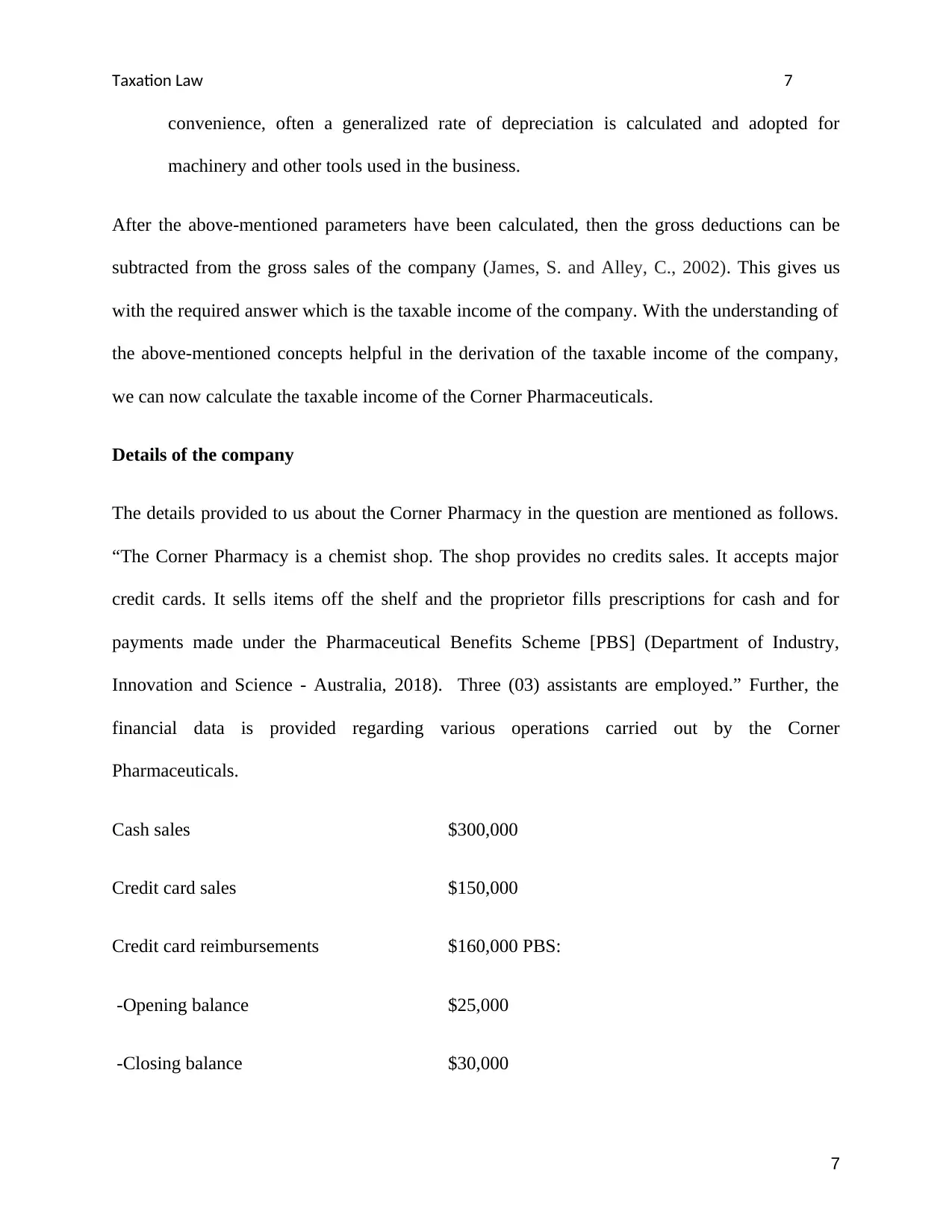
Taxation Law 7
convenience, often a generalized rate of depreciation is calculated and adopted for
machinery and other tools used in the business.
After the above-mentioned parameters have been calculated, then the gross deductions can be
subtracted from the gross sales of the company (James, S. and Alley, C., 2002). This gives us
with the required answer which is the taxable income of the company. With the understanding of
the above-mentioned concepts helpful in the derivation of the taxable income of the company,
we can now calculate the taxable income of the Corner Pharmaceuticals.
Details of the company
The details provided to us about the Corner Pharmacy in the question are mentioned as follows.
“The Corner Pharmacy is a chemist shop. The shop provides no credits sales. It accepts major
credit cards. It sells items off the shelf and the proprietor fills prescriptions for cash and for
payments made under the Pharmaceutical Benefits Scheme [PBS] (Department of Industry,
Innovation and Science - Australia, 2018). Three (03) assistants are employed.” Further, the
financial data is provided regarding various operations carried out by the Corner
Pharmaceuticals.
Cash sales $300,000
Credit card sales $150,000
Credit card reimbursements $160,000 PBS:
-Opening balance $25,000
-Closing balance $30,000
7
convenience, often a generalized rate of depreciation is calculated and adopted for
machinery and other tools used in the business.
After the above-mentioned parameters have been calculated, then the gross deductions can be
subtracted from the gross sales of the company (James, S. and Alley, C., 2002). This gives us
with the required answer which is the taxable income of the company. With the understanding of
the above-mentioned concepts helpful in the derivation of the taxable income of the company,
we can now calculate the taxable income of the Corner Pharmaceuticals.
Details of the company
The details provided to us about the Corner Pharmacy in the question are mentioned as follows.
“The Corner Pharmacy is a chemist shop. The shop provides no credits sales. It accepts major
credit cards. It sells items off the shelf and the proprietor fills prescriptions for cash and for
payments made under the Pharmaceutical Benefits Scheme [PBS] (Department of Industry,
Innovation and Science - Australia, 2018). Three (03) assistants are employed.” Further, the
financial data is provided regarding various operations carried out by the Corner
Pharmaceuticals.
Cash sales $300,000
Credit card sales $150,000
Credit card reimbursements $160,000 PBS:
-Opening balance $25,000
-Closing balance $30,000
7
Paraphrase This Document
Need a fresh take? Get an instant paraphrase of this document with our AI Paraphraser
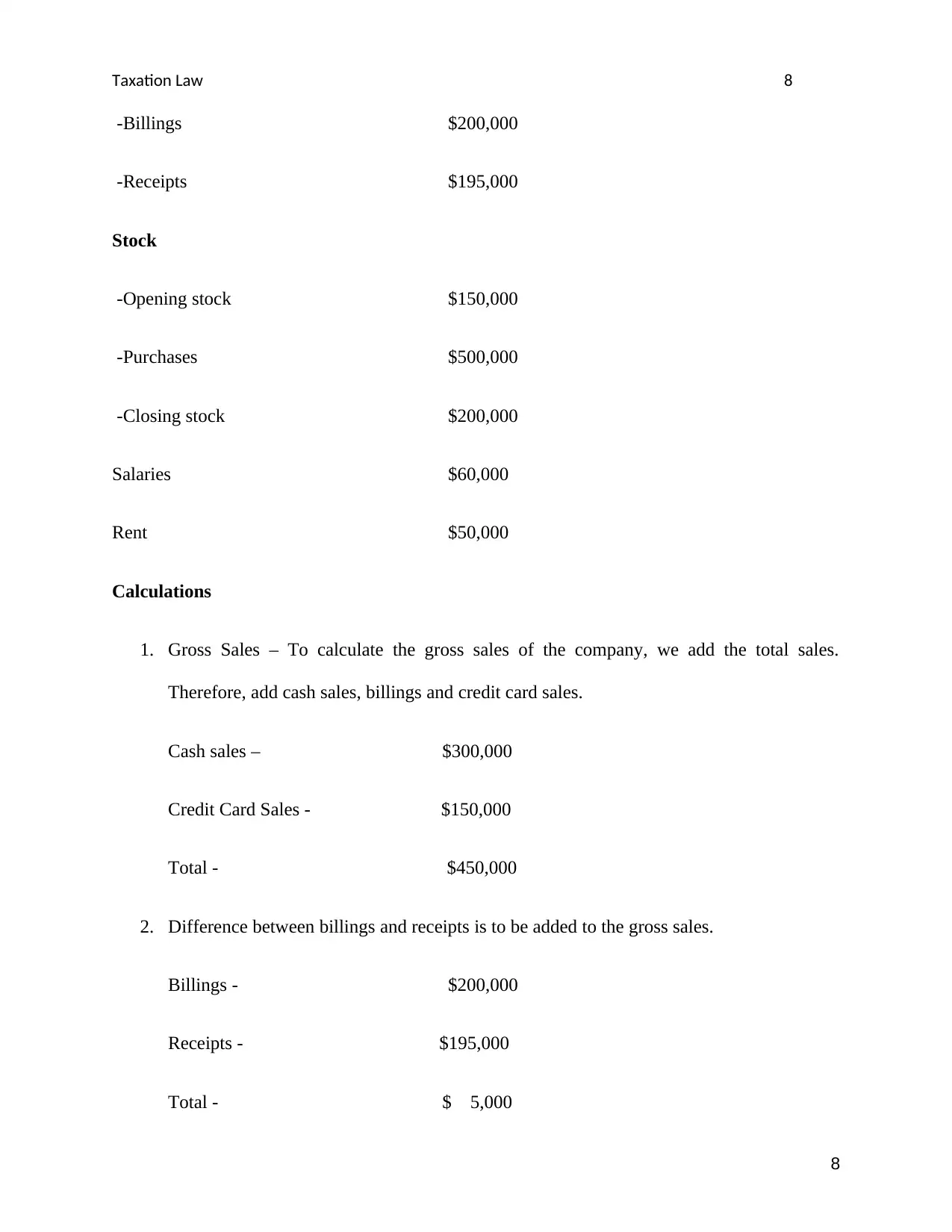
Taxation Law 8
-Billings $200,000
-Receipts $195,000
Stock
-Opening stock $150,000
-Purchases $500,000
-Closing stock $200,000
Salaries $60,000
Rent $50,000
Calculations
1. Gross Sales – To calculate the gross sales of the company, we add the total sales.
Therefore, add cash sales, billings and credit card sales.
Cash sales – $300,000
Credit Card Sales - $150,000
Total - $450,000
2. Difference between billings and receipts is to be added to the gross sales.
Billings - $200,000
Receipts - $195,000
Total - $ 5,000
8
-Billings $200,000
-Receipts $195,000
Stock
-Opening stock $150,000
-Purchases $500,000
-Closing stock $200,000
Salaries $60,000
Rent $50,000
Calculations
1. Gross Sales – To calculate the gross sales of the company, we add the total sales.
Therefore, add cash sales, billings and credit card sales.
Cash sales – $300,000
Credit Card Sales - $150,000
Total - $450,000
2. Difference between billings and receipts is to be added to the gross sales.
Billings - $200,000
Receipts - $195,000
Total - $ 5,000
8
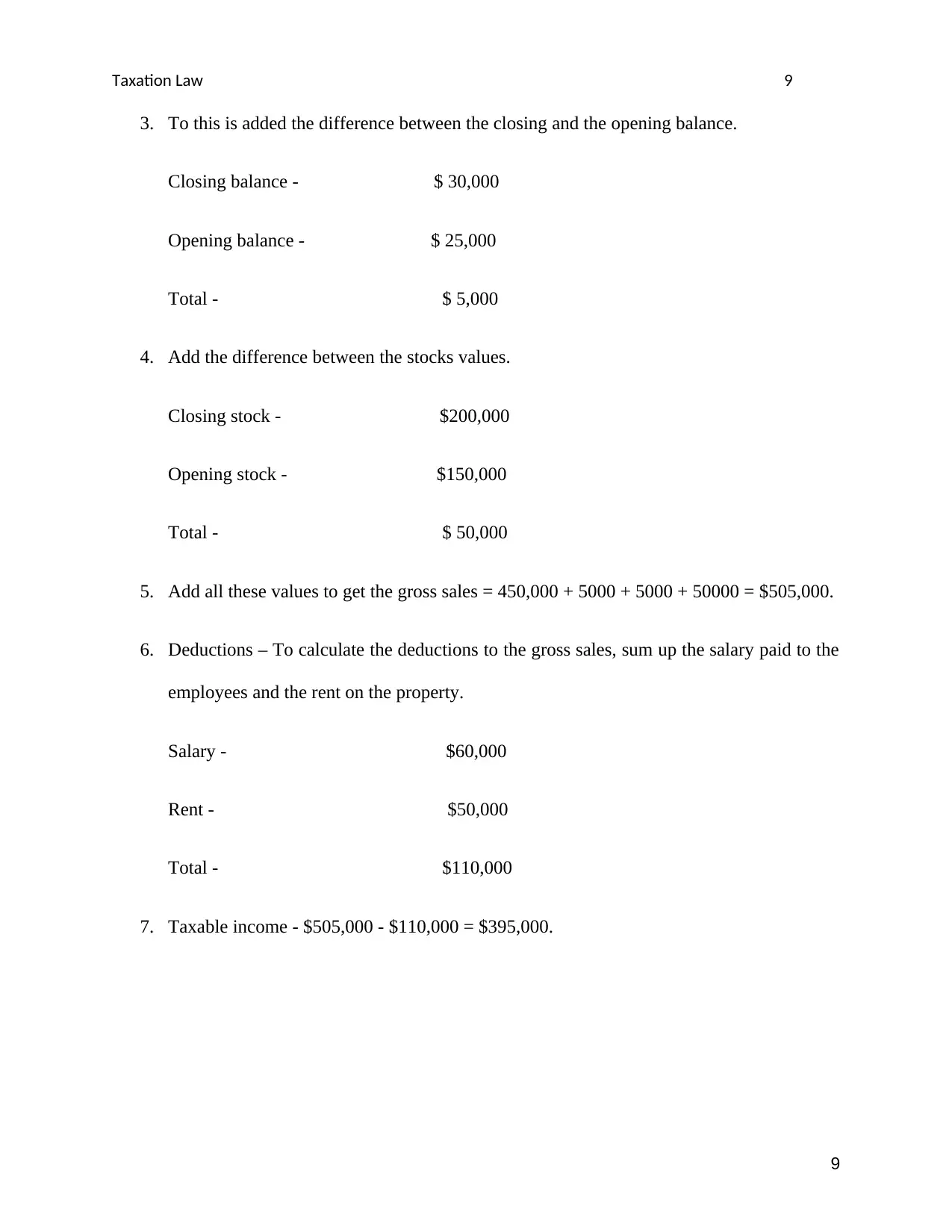
Taxation Law 9
3. To this is added the difference between the closing and the opening balance.
Closing balance - $ 30,000
Opening balance - $ 25,000
Total - $ 5,000
4. Add the difference between the stocks values.
Closing stock - $200,000
Opening stock - $150,000
Total - $ 50,000
5. Add all these values to get the gross sales = 450,000 + 5000 + 5000 + 50000 = $505,000.
6. Deductions – To calculate the deductions to the gross sales, sum up the salary paid to the
employees and the rent on the property.
Salary - $60,000
Rent - $50,000
Total - $110,000
7. Taxable income - $505,000 - $110,000 = $395,000.
9
3. To this is added the difference between the closing and the opening balance.
Closing balance - $ 30,000
Opening balance - $ 25,000
Total - $ 5,000
4. Add the difference between the stocks values.
Closing stock - $200,000
Opening stock - $150,000
Total - $ 50,000
5. Add all these values to get the gross sales = 450,000 + 5000 + 5000 + 50000 = $505,000.
6. Deductions – To calculate the deductions to the gross sales, sum up the salary paid to the
employees and the rent on the property.
Salary - $60,000
Rent - $50,000
Total - $110,000
7. Taxable income - $505,000 - $110,000 = $395,000.
9
⊘ This is a preview!⊘
Do you want full access?
Subscribe today to unlock all pages.

Trusted by 1+ million students worldwide
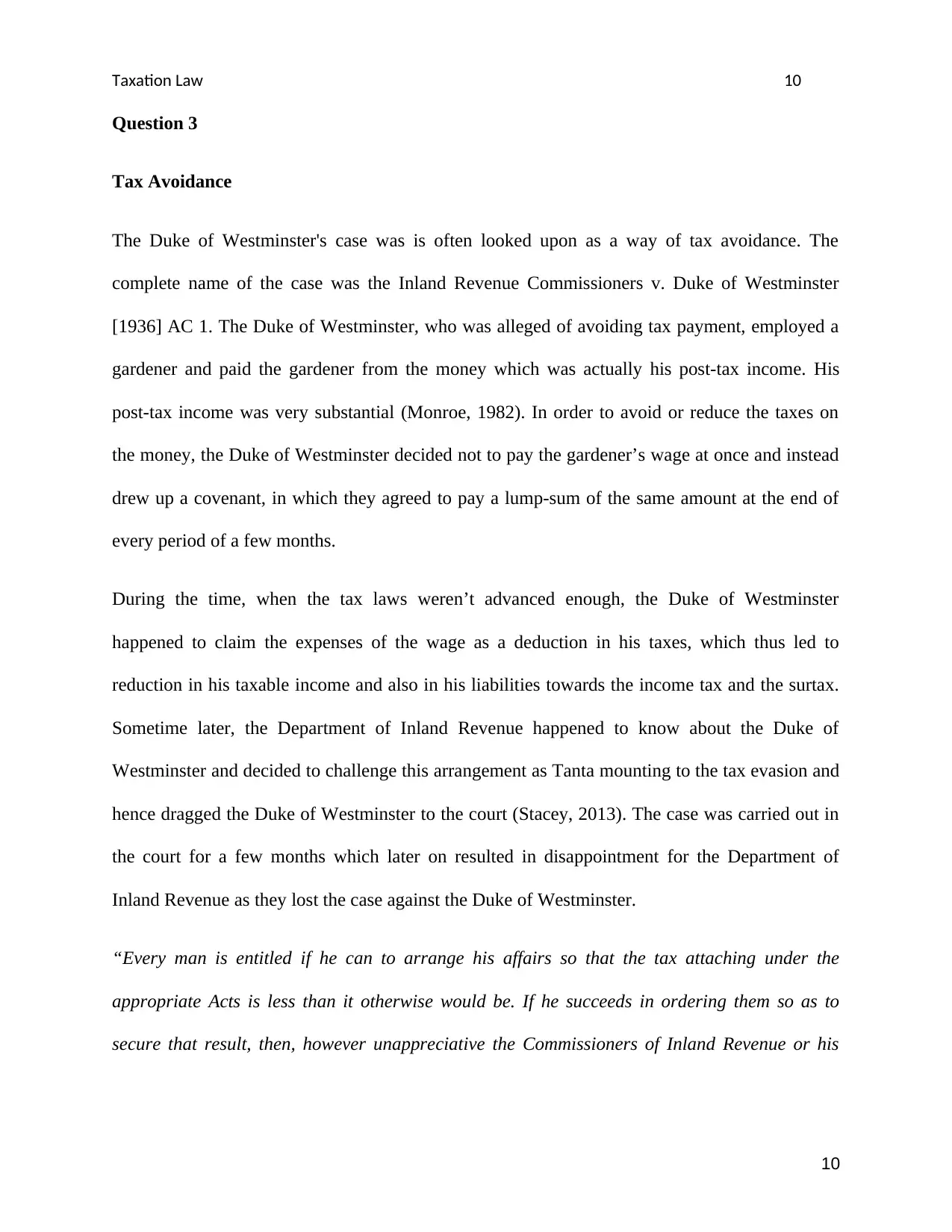
Taxation Law 10
Question 3
Tax Avoidance
The Duke of Westminster's case was is often looked upon as a way of tax avoidance. The
complete name of the case was the Inland Revenue Commissioners v. Duke of Westminster
[1936] AC 1. The Duke of Westminster, who was alleged of avoiding tax payment, employed a
gardener and paid the gardener from the money which was actually his post-tax income. His
post-tax income was very substantial (Monroe, 1982). In order to avoid or reduce the taxes on
the money, the Duke of Westminster decided not to pay the gardener’s wage at once and instead
drew up a covenant, in which they agreed to pay a lump-sum of the same amount at the end of
every period of a few months.
During the time, when the tax laws weren’t advanced enough, the Duke of Westminster
happened to claim the expenses of the wage as a deduction in his taxes, which thus led to
reduction in his taxable income and also in his liabilities towards the income tax and the surtax.
Sometime later, the Department of Inland Revenue happened to know about the Duke of
Westminster and decided to challenge this arrangement as Tanta mounting to the tax evasion and
hence dragged the Duke of Westminster to the court (Stacey, 2013). The case was carried out in
the court for a few months which later on resulted in disappointment for the Department of
Inland Revenue as they lost the case against the Duke of Westminster.
“Every man is entitled if he can to arrange his affairs so that the tax attaching under the
appropriate Acts is less than it otherwise would be. If he succeeds in ordering them so as to
secure that result, then, however unappreciative the Commissioners of Inland Revenue or his
10
Question 3
Tax Avoidance
The Duke of Westminster's case was is often looked upon as a way of tax avoidance. The
complete name of the case was the Inland Revenue Commissioners v. Duke of Westminster
[1936] AC 1. The Duke of Westminster, who was alleged of avoiding tax payment, employed a
gardener and paid the gardener from the money which was actually his post-tax income. His
post-tax income was very substantial (Monroe, 1982). In order to avoid or reduce the taxes on
the money, the Duke of Westminster decided not to pay the gardener’s wage at once and instead
drew up a covenant, in which they agreed to pay a lump-sum of the same amount at the end of
every period of a few months.
During the time, when the tax laws weren’t advanced enough, the Duke of Westminster
happened to claim the expenses of the wage as a deduction in his taxes, which thus led to
reduction in his taxable income and also in his liabilities towards the income tax and the surtax.
Sometime later, the Department of Inland Revenue happened to know about the Duke of
Westminster and decided to challenge this arrangement as Tanta mounting to the tax evasion and
hence dragged the Duke of Westminster to the court (Stacey, 2013). The case was carried out in
the court for a few months which later on resulted in disappointment for the Department of
Inland Revenue as they lost the case against the Duke of Westminster.
“Every man is entitled if he can to arrange his affairs so that the tax attaching under the
appropriate Acts is less than it otherwise would be. If he succeeds in ordering them so as to
secure that result, then, however unappreciative the Commissioners of Inland Revenue or his
10
Paraphrase This Document
Need a fresh take? Get an instant paraphrase of this document with our AI Paraphraser
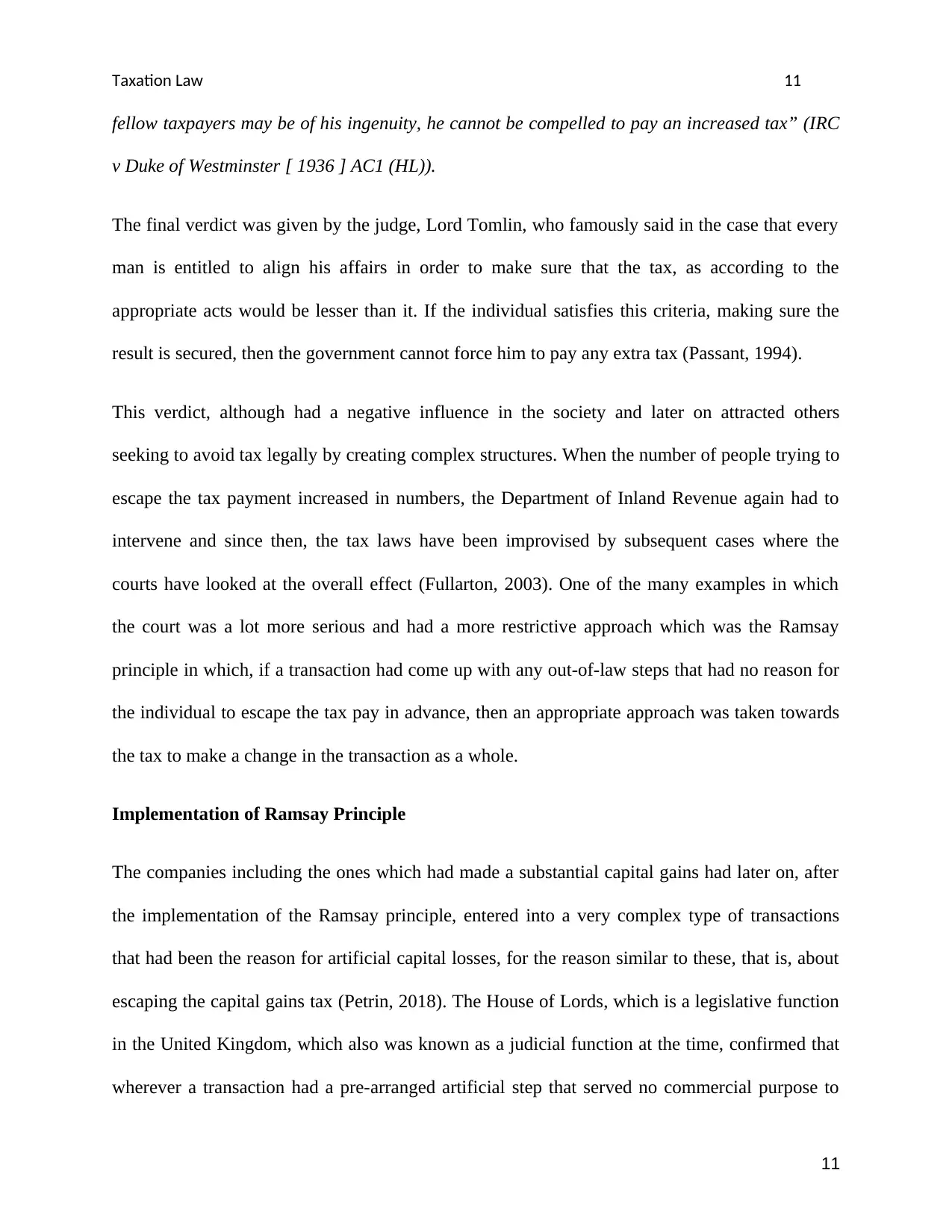
Taxation Law 11
fellow taxpayers may be of his ingenuity, he cannot be compelled to pay an increased tax” (IRC
v Duke of Westminster [ 1936 ] AC1 (HL)).
The final verdict was given by the judge, Lord Tomlin, who famously said in the case that every
man is entitled to align his affairs in order to make sure that the tax, as according to the
appropriate acts would be lesser than it. If the individual satisfies this criteria, making sure the
result is secured, then the government cannot force him to pay any extra tax (Passant, 1994).
This verdict, although had a negative influence in the society and later on attracted others
seeking to avoid tax legally by creating complex structures. When the number of people trying to
escape the tax payment increased in numbers, the Department of Inland Revenue again had to
intervene and since then, the tax laws have been improvised by subsequent cases where the
courts have looked at the overall effect (Fullarton, 2003). One of the many examples in which
the court was a lot more serious and had a more restrictive approach which was the Ramsay
principle in which, if a transaction had come up with any out-of-law steps that had no reason for
the individual to escape the tax pay in advance, then an appropriate approach was taken towards
the tax to make a change in the transaction as a whole.
Implementation of Ramsay Principle
The companies including the ones which had made a substantial capital gains had later on, after
the implementation of the Ramsay principle, entered into a very complex type of transactions
that had been the reason for artificial capital losses, for the reason similar to these, that is, about
escaping the capital gains tax (Petrin, 2018). The House of Lords, which is a legislative function
in the United Kingdom, which also was known as a judicial function at the time, confirmed that
wherever a transaction had a pre-arranged artificial step that served no commercial purpose to
11
fellow taxpayers may be of his ingenuity, he cannot be compelled to pay an increased tax” (IRC
v Duke of Westminster [ 1936 ] AC1 (HL)).
The final verdict was given by the judge, Lord Tomlin, who famously said in the case that every
man is entitled to align his affairs in order to make sure that the tax, as according to the
appropriate acts would be lesser than it. If the individual satisfies this criteria, making sure the
result is secured, then the government cannot force him to pay any extra tax (Passant, 1994).
This verdict, although had a negative influence in the society and later on attracted others
seeking to avoid tax legally by creating complex structures. When the number of people trying to
escape the tax payment increased in numbers, the Department of Inland Revenue again had to
intervene and since then, the tax laws have been improvised by subsequent cases where the
courts have looked at the overall effect (Fullarton, 2003). One of the many examples in which
the court was a lot more serious and had a more restrictive approach which was the Ramsay
principle in which, if a transaction had come up with any out-of-law steps that had no reason for
the individual to escape the tax pay in advance, then an appropriate approach was taken towards
the tax to make a change in the transaction as a whole.
Implementation of Ramsay Principle
The companies including the ones which had made a substantial capital gains had later on, after
the implementation of the Ramsay principle, entered into a very complex type of transactions
that had been the reason for artificial capital losses, for the reason similar to these, that is, about
escaping the capital gains tax (Petrin, 2018). The House of Lords, which is a legislative function
in the United Kingdom, which also was known as a judicial function at the time, confirmed that
wherever a transaction had a pre-arranged artificial step that served no commercial purpose to
11
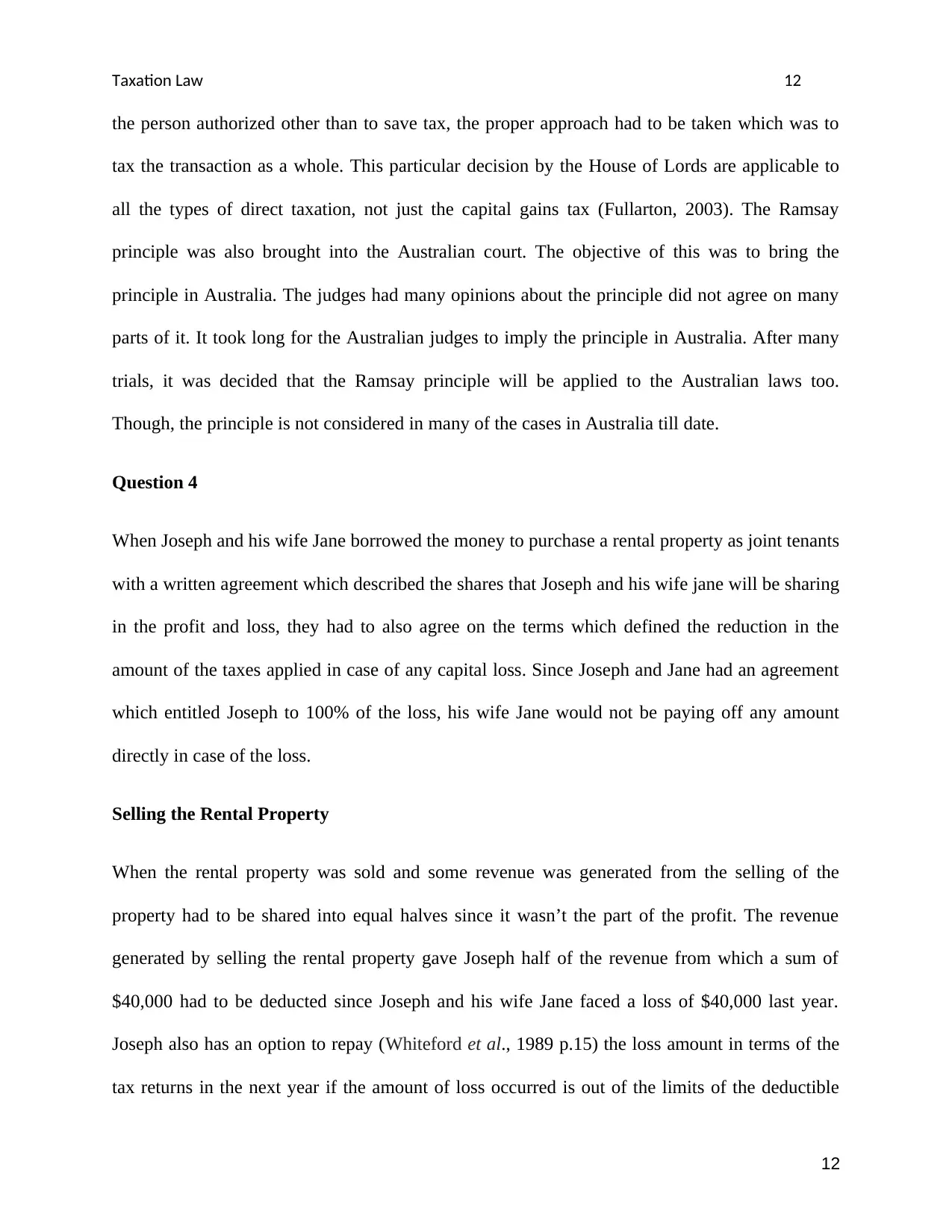
Taxation Law 12
the person authorized other than to save tax, the proper approach had to be taken which was to
tax the transaction as a whole. This particular decision by the House of Lords are applicable to
all the types of direct taxation, not just the capital gains tax (Fullarton, 2003). The Ramsay
principle was also brought into the Australian court. The objective of this was to bring the
principle in Australia. The judges had many opinions about the principle did not agree on many
parts of it. It took long for the Australian judges to imply the principle in Australia. After many
trials, it was decided that the Ramsay principle will be applied to the Australian laws too.
Though, the principle is not considered in many of the cases in Australia till date.
Question 4
When Joseph and his wife Jane borrowed the money to purchase a rental property as joint tenants
with a written agreement which described the shares that Joseph and his wife jane will be sharing
in the profit and loss, they had to also agree on the terms which defined the reduction in the
amount of the taxes applied in case of any capital loss. Since Joseph and Jane had an agreement
which entitled Joseph to 100% of the loss, his wife Jane would not be paying off any amount
directly in case of the loss.
Selling the Rental Property
When the rental property was sold and some revenue was generated from the selling of the
property had to be shared into equal halves since it wasn’t the part of the profit. The revenue
generated by selling the rental property gave Joseph half of the revenue from which a sum of
$40,000 had to be deducted since Joseph and his wife Jane faced a loss of $40,000 last year.
Joseph also has an option to repay (Whiteford et al., 1989 p.15) the loss amount in terms of the
tax returns in the next year if the amount of loss occurred is out of the limits of the deductible
12
the person authorized other than to save tax, the proper approach had to be taken which was to
tax the transaction as a whole. This particular decision by the House of Lords are applicable to
all the types of direct taxation, not just the capital gains tax (Fullarton, 2003). The Ramsay
principle was also brought into the Australian court. The objective of this was to bring the
principle in Australia. The judges had many opinions about the principle did not agree on many
parts of it. It took long for the Australian judges to imply the principle in Australia. After many
trials, it was decided that the Ramsay principle will be applied to the Australian laws too.
Though, the principle is not considered in many of the cases in Australia till date.
Question 4
When Joseph and his wife Jane borrowed the money to purchase a rental property as joint tenants
with a written agreement which described the shares that Joseph and his wife jane will be sharing
in the profit and loss, they had to also agree on the terms which defined the reduction in the
amount of the taxes applied in case of any capital loss. Since Joseph and Jane had an agreement
which entitled Joseph to 100% of the loss, his wife Jane would not be paying off any amount
directly in case of the loss.
Selling the Rental Property
When the rental property was sold and some revenue was generated from the selling of the
property had to be shared into equal halves since it wasn’t the part of the profit. The revenue
generated by selling the rental property gave Joseph half of the revenue from which a sum of
$40,000 had to be deducted since Joseph and his wife Jane faced a loss of $40,000 last year.
Joseph also has an option to repay (Whiteford et al., 1989 p.15) the loss amount in terms of the
tax returns in the next year if the amount of loss occurred is out of the limits of the deductible
12
⊘ This is a preview!⊘
Do you want full access?
Subscribe today to unlock all pages.

Trusted by 1+ million students worldwide
1 out of 16
Related Documents
Your All-in-One AI-Powered Toolkit for Academic Success.
+13062052269
info@desklib.com
Available 24*7 on WhatsApp / Email
![[object Object]](/_next/static/media/star-bottom.7253800d.svg)
Unlock your academic potential
Copyright © 2020–2026 A2Z Services. All Rights Reserved. Developed and managed by ZUCOL.





